Can you really control your dreams, and use them to have wild adventures and find happiness? Tony Barrell went to Hawaii to find out
THE SUNDAY TIMES, 2004
What did you dream about last night? Did you rerun some mundane event of the day — a trip to the supermarket; a chat over the garden fence? Or did you have that recurring nightmare in which you’re chased by an 8ft tax inspector with fangs, and your legs stop working properly? We all dream: researchers say that if you don’t remember any night-time visions, it’s just your memory failing you. What the experts still can’t tell you, definitively, is why we dream, though that doesn’t stop them theorising. Dreams may be an outlet for pent-up emotions, or they may help us organise our memories. They might, as Freud believed, contain subconscious messages about ourselves and the world. Or they could be just mental excreta, a useless by-product of the brain.
Dreams are an adventure playground in which we can have the greatest fun imaginable. You can discover Atlantis, win Wimbledon and have sex with a supermodel
One leading researcher believes that dreams are much more exciting than all of that. Dr Stephen LaBerge says they are an underused adventure playground in which we can have the greatest fun imaginable, and bring fantastic feelings of euphoria and self-empowerment into our waking lives. LaBerge advocates “lucid dreaming” — which occurs when you know you are dreaming. At that point, claims LaBerge, you can take control and change the dream — its setting, its characters, its plot, its denouement. Colours and sensations become incredibly vivid. You can acquire super-powers — fly, breathe underwater, walk through walls. You can discover Atlantis, win Wimbledon, get tickets for Glastonbury and have sex with a supermodel.
Periodically, LaBerge runs lucid-dreaming workshops on the east coast of Hawaii’s Big Island. It’s an inspired choice of location: this 50th American state, this weird paradise of pumice and papaya, ruled over in legend by the volcano goddess Pele, is itself the stuff of dreams.
It is Saturday morning, and LaBerge is giving a lecture to a class of 16 rapt dream students on the second storey of a big wooden hut at the Kalani Oceanside Retreat. As a ceiling fan whirrs overhead and a brief rain shower slaps the huge leaves of the coconut palms outside, he tells us about bedtime anarchy. Rules, you see, don’t apply in dreams: you can float to the ceiling as easily as walking. In fact, if you ever find yourself flagrantly disobeying the rules of gravity, it’s a sure sign that you’re dreaming. If you find yourself walking down the street with no clothes on, bingo! You’re probably dreaming — at least you hope you are.
This is just the first of many long sessions in which the 56-year-old scientist outlines the secrets of dream lucidity. Beside him constantly is Keelin, a 53-year-old female Californian dreamer who is the super-serene “facilitator” of this course, adding her own observations and keeping the show under control. LaBerge and Keelin are, effectively, the Richard and Judy of lucid dreaming, though the quick-fire, wisecracking LaBerge mixes the unpredictable gestures of Richard Madeley with the facial contortions of the late Hughie Green.
LaBerge is more than happy to call himself an “oneironaut” — from the Greek oneiros, meaning “dream”, and nautes, “sailor”. And as a charismatic Californian pusher of alternative life skills, with a bestselling book to his name (Exploring the World of Lucid Dreaming, co-written by the author Howard Rheingold), LaBerge ticks all the boxes for “new-age guru”. But check his credentials.
Lucid dreaming is a scientifically observable state. You can no longer lump it with astrology, tea leaves and fork-bending
He studied at Stanford University in California, where he began rigorous research into lucid dreaming in the late 1970s, obtaining a PhD in psychophysiology. By using eye signals in the depths of REM (rapid eye movement) sleep, he proved that lucid dreaming is a genuine, scientifically observable human state. Thanks to Dr Stephen LaBerge, you can no longer lump it with astrology, tea leaves and fork-bending.
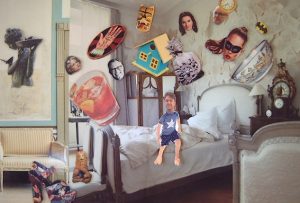
“Dreamsigns”, says LaBerge, are a key to lucid dreaming; clues that potentially reveal we are not in ordinary waking life. As his book puts it, “When people realize they are dreaming, it is often because they reflect on unusual or bizarre occurrences in their dreams.” Your dreamsign could be that 8ft tax inspector with the fangs, the appearance of a long-dead relative, or the fact that everyone is talking in Serbo-Croat. One of the students, Philippe Lewis, 32, who hosts “love parties” in San Francisco — “They’re underground dance parties, except that they’re more open; people can explore relationships” — has already spotted an extremely distinctive clue in his dreams. He catches himself… ahem, self-fellating. “It’s like, wow! Suddenly I’m really flexible. And now, because it’s happened a number of times, I’m trying to identify that as a dreamsign. It’s a strange one — some people see pink cats, and I’ll see that.”
But you don’t have to rely on dreamsigns alone to become lucid. Several of the students are tossing and turning at night wearing a device called the NovaDreamer, which is LaBerge’s invention. It fits round your head like an ordinary sleep mask, but has built-in photoelectric sensors. When these recognise the flickering of your eyes in REM sleep — the best state for lucid dreaming — two red-light-emitting diodes in the mask start winking at you. If you’re having a dream, which you don’t know is a dream, and the little red lights suddenly appear in it, Bob’s your uncle. The NovaDreamer, explains LaBerge, is a mass-market development from various prototypes he created in his sleep laboratory at Stanford. “It was an attempt at making the most inexpensive device that actually worked.” You need to be a dedicated dreamer to own one, though: you have to pay about £450 for the privilege of frightening your spouse in the middle of the night. But it’s a relatively small price for these students, who have already stumped up $2,000 to come to the retreat.

From the moment you realise you’re dreaming, the “world”, such as it is, is supposed to be your oyster. You can script your own adventure, solve problems, or dress-rehearse a tricky future real-life event “such as an oral exam, a dance routine, a meeting with an influential business associate, a surgical procedure, or a difficult discussion with a loved one”, as LaBerge’s dream bible has it. You can overcome fears by confronting your object of terror in a dream, and banish nightmares. If scary monsters are running towards you, try “embracing them with a loving heart”, LaBerge lectures us, and they will be pacified.
If it’s fun they’re after, dreamers often plump for one activity in particular. “Flying is one of the things that most occurs to people when they become lucid,” explains Jennifer Dumpert, 38, a computer consultant and Jane Fonda lookalike from San Francisco, who has had “phases of lucidity” in her dreaming life. “Often I think, ‘Great! I can fly.’ I once had a lucid dream and took off over Manhattan. I went over Central Park, which had all these lakes in it, and there was a bright moon, which was reflecting in all these lakes. It was beautiful. I did a dream flight also over 19th-century London, which was remarkable — all these old grey roofs, and it was winter time.”
In one of my funniest dreams, my cats were running a cat dating service and I was their office manager
Lynette Christensen, 40, who works at a hot-tub shop in Montana, says she’s often whizzing through the air: “Sometimes I fly like Superman; sometimes I fly standing straight up; sometimes I spin while I fly. Sometimes I have on clothes; sometimes I’m naked. In one of my lucid dreams I actually flew to the stars. I’ve also flown with my cats, Sparkey, Abbey and Mike. My cats feature a lot. In one of my funniest dreams, my cats were running a cat dating service and I was their office manager.”
Shortly before coming to Hawaii, Philippe Lewis also lucidly defied gravity, getting on top of a police car and using it as an airborne surfboard. “I decided, ‘Okay, I’m going to have fun with this.’ I decided to accelerate. But I didn’t want to do this by myself, so I summoned this girl I’d met a few weeks before. She jumped towards me and tried to catch my hands, but she fell down. I said, ‘Oh well, she’s just a dream character, so it doesn’t matter.’”
LaBerge asks us to make goals, to focus on what we want to dream about this week. Expert lucid dreamers can manifest particular people, places and themes simply by nurturing an intention to dream about them. Kai Schoppe, 31, who runs a school for t’ai chi and Taoistic meditation in Wiesbaden, Germany, has an unusual dream plan. “I want to experience what it would be like to be a dragon,” he says. Schoppe has practised martial arts in his lucid dreams — tae kwon do, as well as t’ai chi — and says he has even learnt new oriental movements in the dream realm. “I was surprised that the Wachowski brothers, who made the film The Matrix, never talk about lucid dreaming,” he says, “because it’s so much like a lucid dream: Neo’s movements, when he jumps so high. I really like to do this too in my dreams.”
Lynette Christensen decides that, when she becomes lucid, she will receive a “book of knowledge from a dolphin” and read it to learn the meaning of life. And there is pathos among the bathos. Flemming Olsen, 38, from Copenhagen, wants to go all the way back to Denmark to visit his mother: “She’s got pancreatic cancer, and the relationship is not close. It could be a beautiful way to prepare myself for meeting her in real life.” It would only be a rehearsal, explains Olsen; he doesn’t believe that meeting his mother in a dream means he has left his body and is operating at a supernatural level. But not all the students here share his scepticism. Erica Upton, 45, a wine seller who lives near the California-Oregon border, says she plays a mystical game with her young nieces. She hangs a picture on her bedroom door, and they have to visit her house in their dreams, look at the picture and then, back in the wide-awake world, tell her what they saw. “They’re pretty good at it,” she says, “better than me.”
I think a lot of my dream characters have information to give me
Lynette Christensen recently determined to meet her “spirit guide”, Angel, in a dream. “I visualised what she would look like, what setting I would find her in, and then that night she came to me in my dreams.” Does she really believe that obtaining a dream “book of knowledge” would teach her the meaning of life? “I definitely do. I think a lot of my dream characters have information to give me.” She says she has had a lot of precognitive dreams, including some in which she was bumping up and down the hilly roads of this very island. “So I was having dreams about Hawaii, without realising.”
I ask Jennifer Dumpert if she dreamt about Hawaii before coming here. “No,” she says, “but you know, I dream about Wales pretty frequently.” Images of rainy Cardiff flicker through my mind, till she clarifies: “No, not the place: the beasts. Whales. This is a major spot for whale-watching.”
LaBerge is hard-nosed about the supernatural claims. When a student raises the idea that two people can arrange to meet in a dream, and then both have the same dream and exchange real information, he counters with: “I’ve never seen any convincing evidence that we share dreams.” And when I suggest he could found a religion based on lucid dreaming, he replies: “I really don’t see myself going down that route. I feel what I have to do is simply follow what seems true to me, but certainly never to contradict science, because that is one of our true guides to reality. If you throw that away, you’re just going to get lost in dreamland.”
In 1987 he set up an organisation called the Lucidity Institute, “to sponsor and support research on human consciousness”. These days, with his most ground-breaking lucid-dream research a quarter of a century old, the institute appears to have a mainly proselytising function, spreading the word about lucidity and flogging books, NovaDreamers and workshops like this one. LaBerge seems frustrated that many of his peers are still ignorant of his 1970s breakthrough. “One of my strategies now,” he says, “is to get more of the scientific research published in high-profile journals. It’s published somewhere or other, but the literature is so big that scientists may not know the power of the research.”
Tibetan Buddhist monks were practising dream yoga, otherwise known as lucid dreaming, over 1,000 years ago
Just as sex didn’t really begin in the 1960s, lucid dreaming didn’t suddenly start in the 1970s. In 1665, Samuel Pepys recorded a lucid sex dream that gave him “so much real pleasure”, in which “I had my Lady Castlemayne in my armes and was admitted to use all the dalliance I desired with her, and then dreamed that this could not be awake…” But the history goes back much further, and it is no surprise that this course attracts people like Kai Schoppe, with his eastern disciplines. Tibetan Buddhist monks were practising “dream yoga”, otherwise known as lucid dreaming, over 1,000 years ago. “According to the Tibetan tradition,” says Erica Upton, “after you die you go into something like a lucid dream. So all this could be a rehearsal for death. And the idea that I can have an effect on my afterlife in this life is kind of cool.”
There are other classes at the Kalani retreat, teaching that more common form of yoga — the bendy-body sort — and the place is crawling with lithe women and monkish bald men, some of whom are exchanging whispers about “the dream class”, regarding the participants as freakish, even as they meditate with their feet stuck behind their heads. It’s a common reaction, say the dreamers. “I have talked to friends about it,” says John Witney, “and they’re interested, but they talk about it with a smile on their face.” Witney, 39, is a British computer programmer and entrepreneur, one of the founders of the highly profitable JobServe recruitment website. Last September he had a very short, spontaneous lucid dream in which “this guy came running up to me from behind and said, ‘John, John, we haven’t got much time — quick! Leeds, Man U, 3-2, Tuesday.’ And then I woke up”. Not even a football fan, he started checking the schedules to see if Leeds United were indeed playing Manchester United. It transpired that they were indeed playing on a Tuesday, and, though “not a gambling man”, he placed a bet that Leeds would win 3-2. The score turned out to be spot-on, though the dream hadn’t made it clear who would win, and it was 3-2 to Man U, not Leeds.
“I’m not saying I believe it was any kind of prophecy,” insists Witney, “but I was very curious.” Inspired to take up lucid dreaming seriously, he determined to ask the dream character, whom he calls “Pete”, for the latest lottery numbers. Finally, after months of failure, on January 1 he had the dream. “Sure enough, Pete reappeared. I said, ‘Great. Could you give me the lottery numbers, please?’ And he said, ‘Actually, John, I’ve got something more important to tell you.’ I said, ‘No, I’m not interested. Can you give me the lottery numbers, please?’” Pete gave in, handed over the numbers, and Witney awoke and wrote them down. “And then I thought, ‘Idiot!’ He had something really important to tell me, and all I cared about was the lottery. I felt awful.” The numbers didn’t even win him any money — at least so far.
For a while he couldn’t find Pete, and thought the adventure was over. Then, about a week before he came to Kalani, Witney dreamt about Pete again, and “for some reason he suggested we meet on a diving board. I’ve got a swimming pool at home in Surrey, but it doesn’t have a diving board”. Witney also has a boat back home, a 58ft motor cruiser, and he’s so taken with his bedtime adventures that he’s called it Lucid Dream. But he is racked with an inner conflict. “It all sounds a bit new-agey, which I’m embarrassed about. I’m very logical, and I’m not into anything supernatural. So it’s a surprise for me to find myself even talking to you here in these terms.”
Early on in the course, he experienced the next episode, in his “longest lucid dream ever”. Walking around the grounds of the retreat, he suddenly realised he was dreaming, whereupon he spun around and travelled magically back home, to find he suddenly had a diving board and Pete was on it. Pete was trying to tell him a big secret, but Witney’s pencil didn’t work, and then somebody told him they were going back to Kalani because there had been a terrible accident and John Witney was in trouble. Worried by this news, Witney then tried to wake up but found he couldn’t; he asked people for help. The Dalai Lama appeared at one point, as did Stephen LaBerge, who was “on a boat” and couldn’t help. Eventually, Witney “woke up” to find himself on a stretcher, beside an ambulance at Kalani, a big explosion having wrecked his room. Then he really did wake up, in his room, which was undamaged.
Witney’s dream epics keep the whole class entertained. But this latest one, with its deceptive false awakening, is a lucid nightmare, and gives the lie to the idea that dream control is easily achieved and maintained. One night, Lynette Christensen has an even worse experience. “I was in this dark, crowded prison — and I immediately became lucid because I realised that I was not really in a prison. The prison was filled with men, and a lot of them were evil. By ‘evil’, I mean they wanted to rape me. They’d come up behind me and grab me, and they’d be naked, and I’d have to fight them off. That was pretty terrifying. I realised I was dreaming but I couldn’t do anything to get out of the dream.” When she tried to wake, she found she had sleep paralysis — an immobilisation of the body that is normal during REM sleep. “And I came out of my body — I was standing up, looking at myself on the bed, and although I could hear myself screaming, my lips weren’t moving and there wasn’t any sound coming out of my mouth. When I woke up I was really upset; I was shaking and crying.”
In his book, LaBerge does address the possible dangers of lucid dreaming. “The overwhelming majority of lucid dreams are positive, rewarding experiences,” he says. “… Nevertheless, there probably will be some people who find the experience of lucid dreaming… extremely disturbing. For this reason we cannot recommend lucid dreaming to everyone.”
Isn’t there a danger, I ask LaBerge, that deep immersion in lucid dreaming makes people more inward-looking and self-absorbed? “It could,” he replies, “but you could also seek to develop your compassion, for example, in a dream, which does the opposite. And I can think of people who have overcome shyness through lucid dreaming.”
On my last day under the sun-kissed coconut palms, I wear a turban and walk around telling people that I’m Kurdish
I think lucid dreaming is akin to a martial art: it’s something that takes enormous patience and dedication, and not all of us can or should do it. I, for one, flunked the course. As soon as I put the NovaDreamer on, I was blighted with acute insomnia, like an actor with stage fright.
 On my last day under the sun-kissed coconut palms, I decide to wear a turban and walk around telling people that I’m Kurdish. I hear news that a “pack of cats”, a kind of feral feline version of a rat-king, their bodies all connected in some way, is terrorising the retreat.
On my last day under the sun-kissed coconut palms, I decide to wear a turban and walk around telling people that I’m Kurdish. I hear news that a “pack of cats”, a kind of feral feline version of a rat-king, their bodies all connected in some way, is terrorising the retreat.
It’s all so obvious, isn’t it? But only when I wake up do I realise it’s a dream, and I’ve been home from Hawaii for two whole weeks. Next week I’m going to have a crack at Japanese flower-arranging. ♦
© 2014 Tony Barrell
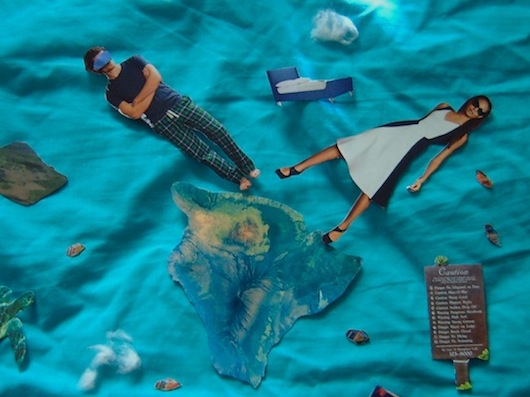
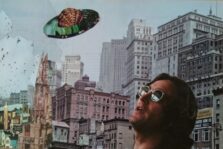
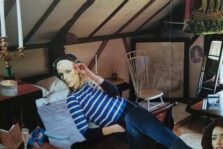
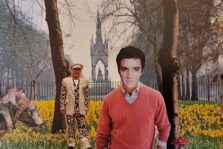

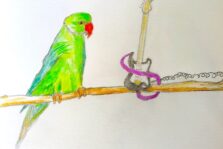
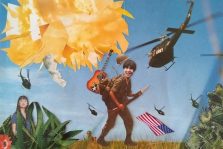


Loved this article! It’s inspired me to take up Lucid Dreaming. But only in my spare time…